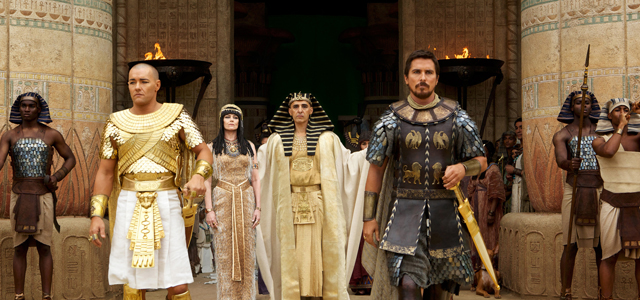(M) Starring: Christian Bale, Joel Edgerton, Ben Kingsley
Exodus: Gods and Kings is based on one of the most important stories in the Jewish and Christian traditions. The film begins with Moses (Christian Bale) as an adult. He has been raised as a prince of Egypt, a brother to the future pharaoh, Ramses (Joel Edgerton) and he is a general of the Egyptian army. He has been blessed with leadership qualities and has the respect of the Egyptian nation and his uncle, Seti, the current Pharaoh (John Turturro).
After proving himself on the battlefield and a series of events, he is confronted with his actual familial history and the prophecy of his role in the salvation of the Hebrew nation. Due to the death of an Egyptian guard, Moses is exiled from his home country and eventually comes to Midian. He marries and takes on the role of husband, father and shepherd in his adoptive homeland. While chasing stray sheep on Mount Horeb, he is confronted by God who comes to him in the form of a child. Moses is charged with freeing the Hebrew nation from 400 years of Egyptian slavery. Leaving behind his family, he goes back to Egypt and confronts Ramses. Moses threatens the Pharaoh with a divine warning — free the Hebrews, or face God’s wrath. The Pharaoh’s pride does not allow the slaves to be freed.
The powerful nation of Egypt is destroyed through the decimation of it’s water and food sources. In plague proportions, flies, frogs, locusts, boils and darkness scourge the entire country. When the final plague is to come, Moses goes to his adopted brother and pleads for mercy for his people and the nation of Egypt.
Exodus: Gods and Kings represents a revision of the true story that many will know from Sunday school and church stories. Even with reliance upon good special effects for the retelling of the Biblical narrative, not much could pull this film out from under its poorly written screenplay. There is always room for artistic license, to fill in the gaps of the biblical narrative. But inexplicable is the decision — made by Exodus: Gods and Kings‘ writers and director Ridley Scott — to rewrite the core of the story.
The number of challenges presented by Scott’s version of events are innumerable: God’s depiction as a child; the roles of Miriam and Aaron; the management of the plagues; and Moses’ belief in God. Theologians could spend days tearing apart the film, and a multitude of articles has been written since Exodus hit cinemas. While analysing the film’s theological content is not the main point of this review, some do have to be addressed. For example, the depiction of God as a spoiledand vindictive child shows lack of understanding about the Exodus events — and about God himself. Interestingly, the Biblical narrative already provides plenty of drama, but Scott’s attempt to minimise God’s role in the story takes out its heart.
Exodus: Gods and Kings will be inevitably compared with Noah and, to a lesser degree, Son of God. To have three biblical epics released within a calendar year is unprecedented. But the Bible is rich in content, and clearly can provide Hollywood with a multitude of options for great tales. The challenge lies within what kind of artistic liberties are taken with these big-screen adaptations.
The biggest disappointment with Exodus: Gods and Kings is not merely the poor usage of the original narrative, but with Ridley Scott. He is a film legend and has directed some of the greatest films in history. But his latest work went on to fail in a bigger way than Aronofsky’s Noah, due to the poor use of the source material. Noah and The Flood is a relatively short narrative in the Bible and, to fill the running time of a feature film, warrants some creativity. On the other hand, the book of Exodus is full of rich content. With the resources available to him, Scott had the opportunity to put forward an epic film and to redefine the later part of his career. If only he had just told the story and added his celluloid artistry. It could have been great. Instead, the telling of this Moses account is slow and frustrating.
For Scott fans, Exodus: Gods and Kings will not put faith back into the work of this master filmmaker. For the fans of God’s story, you will be frustrated by how this part of it is so misrepresented. However, instead of railing against Scott’s film, be ready to clarify what really happened in Egypt by re-reading the biblical account.
If you want to see a better representation of the Exodus story, watch the animated, musical adaptation, The Prince of Egypt. But in the end, the old saying “The Book is much better than the film” applies to both these films about Moses and his mission.
Read the Book.
What is the bigger question to consider from this film?
What is the real story of Moses and the Exodus? To find out, read the book of Exodus in the Bible.
Russell Matthews works for City Bible Forum, and is a regular blogger. You can read his reviews at russellingreveiws.blogspot.com.au





